Why is the Royal Bath and West Show so successful?
- Published
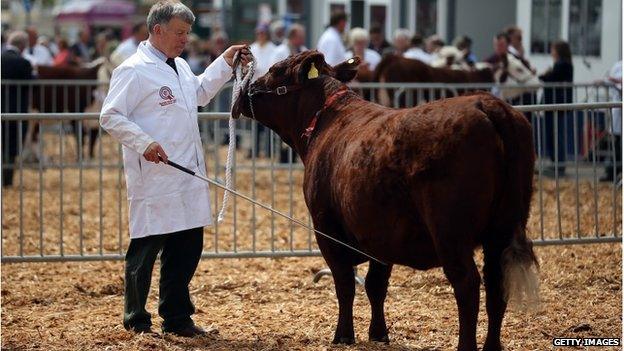
Cattle are in the judged in the ring at the Royal Bath and West Show on opening day
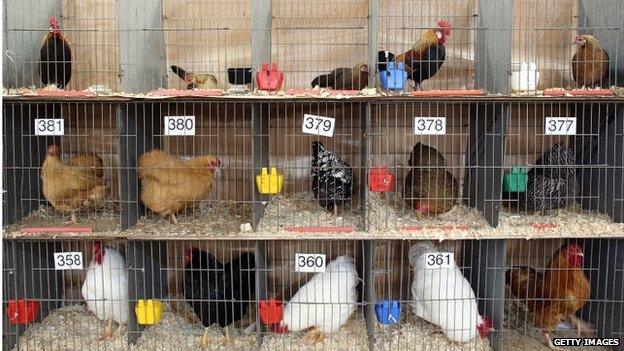
The show is the only four-day event of its kind - chickens are entered for competitions
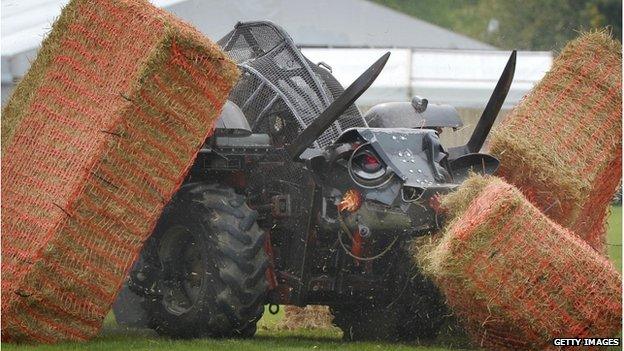
Joe Rush drove the Minotaur smashing through hay bales for the Michael Eavis Montage at the show
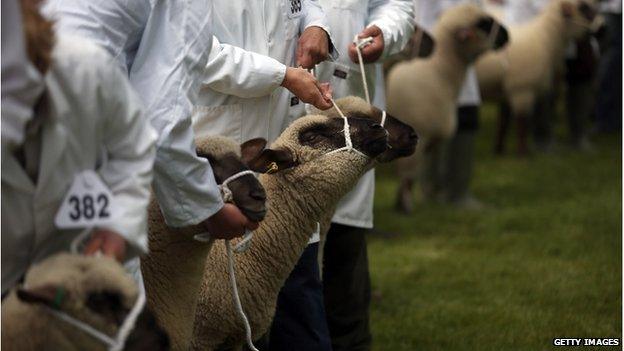
There have been nearly 1,320 sheep entered for competition - more than at the Devon County Show
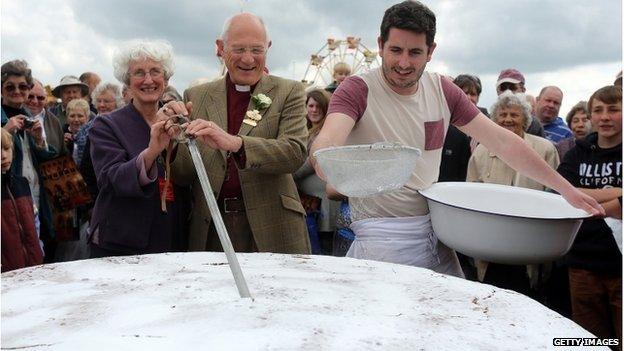
A Minehead baker's huge Victoria sponge was cut by the Bishop for Bath and Wells, the Right Reverend Peter Price
The Royal Bath and West Show is celebrating its 150th year - but what has made it so successful while others have either been shelved or scaled down?
In 1777, a group of gentleman met in Bath and formed a society for the encouragement of Agriculture, Arts, Manufactures and Commerce.
This was the start of the Royal Bath and West Society, which produced pamphlets on pest control and encouraged research into modern farming techniques.
Changing industry
Show organiser, Alan Lyons, said: "Basically (the society) would have been academics - it was at the time of history when the population was growing, therefore the country had to provide more food to feed a growing population as the cities expanded.
"Improving your livestock husbandry or your crop production that was the way of upping all this but at the time there was no platform to exchange all that knowledge."
It is this ethos that has grown - since the first show in 1852 - to embrace new farming techniques and reflect the changing nature of the farming industry.
"I think it is the fact that we move with the times - and Somerset and West Country businesses can come here and reach 150,000 people," said Mr Lyons.
"I know you can have all the social media in the world but you can't beat meeting someone face to face and hearing about their product or their service."
There are year-round benefits to the local economy too.
Rupert Cox, from the Somerset Chamber of Commerce, said: "The direct effect that the show itself has is the trade around the show.
"The indirect [effect on the] economy is those supporting and supplying the showground with accommodation, transport and supplies - virtually all this comes from the local community.
"Certainly those within the rural environment and the equine communities rely on the income that's created and the profile that's raised at the show to help them trade throughout the rest of the year."
But in past years, the show has been criticised for the wide variety of products and services on offer - which are not all directly related to farming.
In 2011, Bridgwater MP, Conservative Ian Liddell-Grainger said he thought the show did not focus on farming enough and accused it of not being a proper agricultural show.
Similar concerns have been seen in other parts of the country, and blamed for the loss of the East of England Show in Cambridgeshire.
Organisers, the East of England Agricultural Society, said it had become "disconnected from its agricultural roots". It had been running for 200 years.
In 2009, the four-day long Royal Agricultural Show in Warwickshire was cancelled - due to a combination of a lack of interest, animal diseases and poor weather.
'Balance' of traders
As with previous years, 2013's show includes dozens of commercial stalls selling everything from skincare products to toys and clothing.
Organisers have admitted it is a "fine balance" to achieve against the expectations of an agricultural show.
"I don't think having rows and rows of shiny tractors makes it any more of an agricultural show," said Mr Lyons.
"I think it is the business behind the scenes that makes the huge difference - if you walk down the cattle lines, nobody can say the show isn't agricultural."
This year, show organisers have said livestock entries are at "record levels" with more than 420 beef cattle, 1,320 sheep and nearly 350 pigs competing in the livestock classes.
As a result there will be more cattle than in the Royal Cornwall Show and more sheep compared to the Devon County Show, organisers have said.
Confidence remains high for future shows.
"We are always thinking about the show and where we are going in the future and how you keep the thing fresh," said Mr Lyons.
- Published15 May 2013
- Published24 May 2013
- Published31 May 2012
- Published6 September 2011
- Published13 June 2011